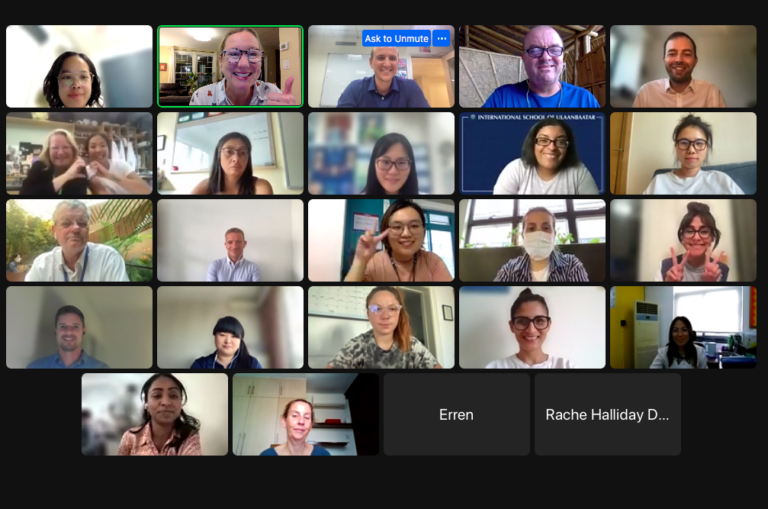A screenshot of a 2022/23 PLC meeting of global citizenship & service learning educators.
By LeeAnne Lavender, PeerSphere storyteller
As a passionate PreK-12 international educator who wants to continue growing as a professional who designs interactive, engaging and impactful learning experiences for students, it’s important to create a professional learning (PL) plan to maximize your creative and innovative energy.
Post-pandemic, we have more options for excellent PL. Face-to-face options including workshops and conferences have resumed, and online options have flourished and expanded, offering a whole new range of webinars, workshops and opportunities to engage with educators around the world.
Peer learning communities (PLCs), which were around before the pandemic but usually constrained to job-alikes at educators’ conferences, are now a vibrant and exciting way to engage in professional development. While there’s a lot of crossover between peer and professional learning communities, such as their collaborative approach, PeerSphere’s PLCs prioritize international collaboration, learning and resource-sharing, whereas professional learning communities are typically school-based, with small teams working on a narrower focus.
There are a lot of reasons why participating in a PLC is a good investment in your professional growth, and this post explores the top ten ways PLCs can transform your professional practice.
- Collaboration: PLCs can foster an environment where educators collaborate, share ideas, and collectively solve problems. A collaborative approach can enhance your understanding of a variety of strategies and tools, especially when your community is made up of experienced and exemplary peers.
- Diversity: Interacting with colleagues from a variety of schools and backgrounds can provide exposure to diverse perspectives, philosophies and cultural approaches. It can be challenging for busy educators and school staff to find time to seek out points of view different from their own, and participating in a PLC naturally creates partnerships and conversations where this is possible.
- Innovation and Creativity: Discussions and connections through dialogue inspire innovative thinking and creativity. Participating in a PLC can invigorate your teaching methods as you hear from peers about hands-on examples and experiences from their classrooms or other school areas.
- Valuable Feedback: Working with a group of experienced and open-minded peers is incredibly valuable when you want to share ideas or models for new things you’d like to try in your classroom or school. The insights you glean from peer interactions can help you refine your teaching techniques and adapt to changing educational trends. PeerSphere is maximizing its feedback and dialogue tools for 2023/24, with a Huddle Up partnership as a great example.
- Resources: It’s very common in PLCs for people to readily share resources, lesson plans, teaching materials and exemplars. This can save you time when you’re planning or redesigning curriculum, and the collaborative nature of this process can enhance the quality of your teaching materials.
- Reflection: Interactions with peers promotes self-reflection. As you discuss your own experiences in breakout rooms and other online PLC settings, self-reflection happens naturally. Sharing challenges with peers and getting feedback and suggestions also inspires a reflexive mindset and approach. We all know that reflection is a key and essential part of learning (for our students and for us as teachers); participating in a PLC provides purposeful time for you to slow down and make reflection part of your ongoing practice.
- Networking: PLCs provide excellent networking opportunities. Building connections with peers can lead to collaborations, conference invitations, leadership possibilities and even potential job opportunities down the road.
- Community: Teaching can sometimes feel isolating, especially if we don’t have a supportive team on-site at our school. This can be particularly true for people who work in a variety of roles (teaching or non-teaching) that are singular or involve only a few others in a similar position. Certain coaching positions or support roles are like this, where there might only be one or two people on campus doing similar tasks. Participating in a PLC offers a supportive community where you can connect with others and share both successes and challenges. This can impact your overall sense of belonging and well-being as a professional.
- Research-based Learning: In your PLC, you’ll probably engage in discussions about research and best practices in your discipline. This helps you stay up-to-date with the latest educational trends and helps you apply evidence-based techniques in your classroom or school to enhance learning for your students.
- Solution-focussed Outcomes: PLCs focus on continuous improvement and finding solutions for your short- and long-term needs as a passionate educator; this helps you refine your work over time. Regular discussions about best practices and what’s optimal for student learning ensure that you’re always striving for excellence and growth. This transforms your experience as an educator as well as the experiences you design for students, which is a win/win scenario!
There are more reasons than these top 10 to include PLCs in your professional learning plan for 2023/24 and beyond, but this top 10 list provides more than enough inspiration to seek out a PLC option.
PeerSphere is offering 44 PLC spaces for 2023/24. Check out their offerings if you’re not already signed up for a PLC, and prepare for some impactful peer learning opportunities in the months ahead.
Further Reading & Listening:
- Edutopia: “How Educators can Use PLCs for Innovation and Support”
- Education Week: “Professional Learning Communities can ‘Unleash the Learning’”
- Steve Barkley’s Thinking Out Loud podcast: “Do We Have Real Professional Learning Communities?” (This is more about PLCs with teams in schools, and it’s a wonderful complement to thinking about PLCs that are more regional and thematic.)




